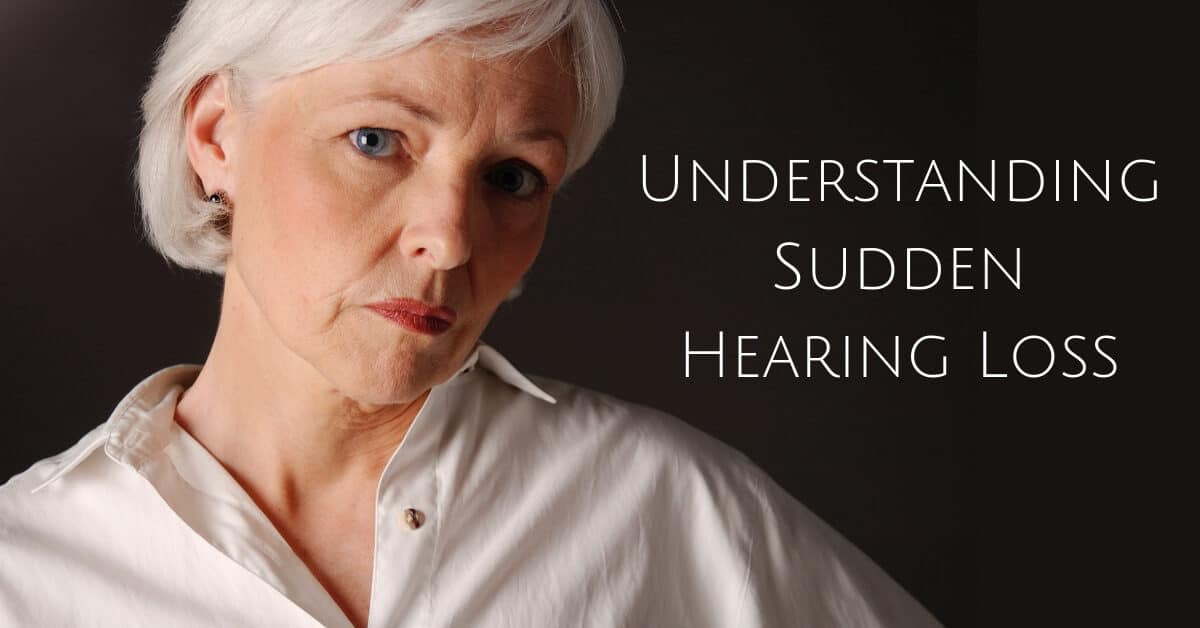
Hearing loss is a common medical condition that can be acquired in different ways. For many, the natural process of aging leads to presbycusis (age-related hearing loss), while for others, exposure to loud sounds over long periods of time could lead to permanent noise-induced hearing loss.
Our ears are always on, so the years of constant sonic inundation wear down the sensitive membranes and organs to the point that they are less receptive to slight changes in pressure. This process happens to most people as they get older, and assistance in the form of hearing aids can be an incredible form of treatment, making it possible to hear clearly long into the later years of life.
However, a different form of adult hearing loss follows a completely different causal path, and it is important to understand the differences as well as the necessary treatments for this type of hearing loss. Sudden hearing loss develops within a few hours or is noticed on awakening. Affecting only .01% to .02% of people each year, it tends to be unilateral, meaning that it affects only on ear, and may range from mild to profound. Many also experience the accompanying symptoms of tinnitus, dizziness, or vertigo. In an effort to understand this rare condition, let’s take a look first at the causes and then the possible treatments of sudden hearing loss.
Causes of Sudden Hearing Loss
Unfortunately the majority of cases of sudden hearing loss are idiopathic, meaning that they arise spontaneously with no known cause. Although these cases make treatment very difficult, some other cases have known origins and are much easier to diagnose and treat. Obvious events may cause the condition, such as an acute infection (for example, mumps, herpes or bacterial meningitis), head or ear trauma (including scuba diving accidents), or exposure to ototoxic drugs (those that cause hearing loss). Hidden disorders may also be the cause, including Meniere’s Disease, autoimmune disorders, multiple sclerosis, or sickle cell disease.
Comprehensive hearing tests are the most effective way to diagnose hearing loss, though with sudden hearing loss, doctors may require a CT scan or MRI to identify related conditions. In very rare cases, neurological conditions may cause asymmetrical hearing loss between the ears, meaning that a person has some hearing loss in each ear but that they occur in different degrees. These neurological conditions signal that the sudden hearing loss is due to a problem in the auditory nervous system when an obvious event in one of the ears cannot be identified.
Treatment of Sudden Hearing Loss
The ultimate treatment for some of these forms of sudden hearing loss may involve treatment of the underlying condition. For example, if a perilymph fistula has been identified in the membrane connecting the air-filled middle ear and the fluid-filled inner ear, then that fistula will need to be removed in order to treat the sudden hearing loss. However, most cases of sudden hearing loss have no known cause. Those cases are, of course, much more difficult to treat. Steroid treatment is the most common path prescribed by most doctors. Glucocorticoids such as Prednisone can be given orally or through injection for two to three weeks in hope that they will resolve the sudden hearing loss of unknown cause. These treatments have been the most effective for those with idiopathic sudden hearing loss. New treatments are being devised every day. Hyperbaric oxygen therapy is being tested with unknown success, and clinicians are hopeful new lines of treatment may be even more successful than steroid treatment. In a significant percentage of cases, sudden hearing loss goes away on its own, so many who experience the condition are left to hope for the best.
If you are concerned that you may have sudden hearing loss, it is important to get to a doctor right away. Delaying treatment can reduce the likelihood that you will be able to reverse the symptoms, so time is of the essence.
Visit Us at My Hearing Centers
Even if you feel that you have not had sudden, significant hearing loss, regular hearing tests are an important part of your overall hearing health plan. With the high likelihood of eventual hearing loss along with the process of aging, it is important to have hearing exams early enough to catch the first incidence of hearing loss and to begin the process of assistance when it becomes necessary. Hearing assistance comes with a wide range of benefits, so don’t miss out! Contact us at a My Hearing Centers location today to schedule a hearing test.
